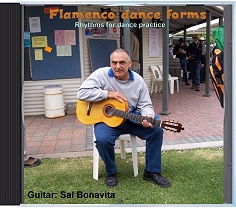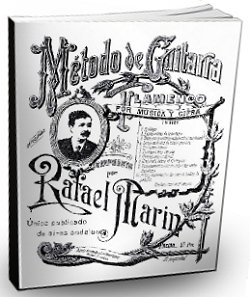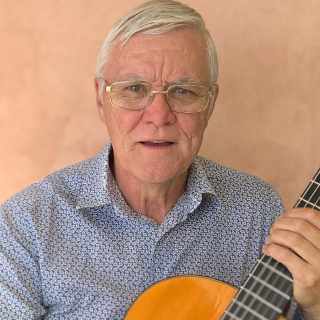(Brook Zern) Duende essay
The magic elf
Variously defined as ghost, specter or goblin, the word 'Duende' could also be interpreted as the power to attract through personal magnetism and charm. In flamenco, this word is used to describe the trance like fixation, or haunting feeling one may experience while enjoying a flamenco performance.
Duende is an inner spirit, which is released as a result of a performer's intense emotional involvement with the music, song and dance. If you experience a shiver of recognition, even for an instant, it means the duende has successfully transferred a lifetime's worth of joy and pain from the performer to you.
 If you're still young enough to believe, I've heard tell there is a mysterious singing frog called Coqui Duende that lives in the Dwarf Forest of Puerto Rico. To the people who named this frog, Duende is another way of saying 'elf'. Flamencos also sometimes describe Duende as an elf, although I'm not really sure why. While we're on the subject of elves, check out this Portuguese site for children called Duende. Anyway, where was I? Our flamenco
If you're still young enough to believe, I've heard tell there is a mysterious singing frog called Coqui Duende that lives in the Dwarf Forest of Puerto Rico. To the people who named this frog, Duende is another way of saying 'elf'. Flamencos also sometimes describe Duende as an elf, although I'm not really sure why. While we're on the subject of elves, check out this Portuguese site for children called Duende. Anyway, where was I? Our flamenco frog elf apparently has magic powers that enable it to place the audience in a state of trance not unlike mass hypnosis. It will reach inside the heart and sprinkle magic seeds of emotional excitement, which transfixes the attention and captures the imagination. This may result in a heady rush of hedonistic fulfillment that will cause you to spontaneously shout "Ole!"
"DUENDE IS A POWER and not a behavior, it is a struggle and not a concept. I have heard an old master guitarist say, 'Duende is not in the throat; duende surges up from the soles of the feet'. Which means it is not a matter of ability, but of real live form; of blood; of ancient culture; of creative action." Federico Garcia Lorca.
The spiritual connection
I don't remember where I read it, but someone once described flamenco as being a sacred ritual to the Gitanos. In this context, Duende is that spiritual calling connecting the soul to the essence of life, or an inner yearning to become one with nature. That's an interesting and valid viewpoint, but I don't particularly like the underlying implication that the phenomenon is exclusive to gypsies. One begs to ask if the rest of humanity is excluded from "that spiritual calling connecting the soul to the essence of life."
Without forgetting that many flamenco songs started out as part of gypsy rituals and ceremonies with some culturally specific spiritual meaning, we can easily overdo it out of respect. I, for one, have a great deal of respect for gypsy culture. But that's not the point. As a living, breathing human capable of the same inner yearnings as the average gypsy, I dare to step up and claim Duende as a natural part of everyone's spiritual heritage, not just gypsies. No culture or race is any more spiritual than another. To intelligently analyze this thing, and to better understand how it relates to flamenco, we could do well to approach it from different angles. After all, relevance is a key issue when one is not a gypsy like myself, so let's step out of this gypsy mind set circle and try to understand what it really means to all of us.
If we prettify or spiritualize Duende too much, we could easily go all poetic and romanticize the whole concept as something that is beyond our understanding as mere mortals. Furthermore, if we walk through life with rose colored glasses on we are likely to adopt a distorted view of reality and if we don't watch our step, it could lead us dangerously close to the edge of mystery. So let's gently back away from this noble, spiritual perspective and look at Duende with our feet firmly planted on the ground. Well! Sort of.
The psychic connection
Some people believe in telepathy. This can be broadly defined as the transfer of thoughts across space from one person to another. In a similar sense, Duende could be described as the transfer of emotions across space. If we are passionate enough in what we do, the audience will sense the projected emotional content and be touched by it. They will realize at a deeper level that they are witnessing more than just a showy display of tourist flamenco. To quote from my favorite philosopher, Yoda from Star Wars, "Do, or do not. There is no try". And there is no worrying about whether the dance has been rehearsed enough, or whether anyone noticed the missed note in the picado passage of the last falseta. From this perspective, it is more than just a transfer of thoughts or emotions. It becomes a psychic phenomenon where the very essence of who you are at that moment is transferred to others, with a little help from the force.
In order for this to work, I believe the basic approach is not to copy someone else or to pretend to be something you're not, but simply to be yourself. To take a lesson from the psychologist Carl Jung (1865-1961), the collective unconscious is the psychic connection that binds us all across time and space. It has no affiliation to any specific culture, race or language, and it doesn't judge you by what you believe about yourself
The demonic connection
Duende is sometimes portrayed wearing darker clothes. From this point of view, it can be described as a seductive and primal form of "channeled" energy from the twilight zone, which enters the body and takes over for a while. I see nothing strange about that.

There are those who believe that Duende is essentially a demon, which the performers themselves inwardly summon up in order to grace the venue with a special 'spiritual' quality. This quality, when it arrives, casts a spell over the audience and everyone becomes involved. This is a paraphrased quote from some book. Sorry, I don't remember which one. Anyway, the demonic character of Duende is not my invention, I just think it makes sense and I agree with it.
| << Previous [1] 2 3 Next >> |






